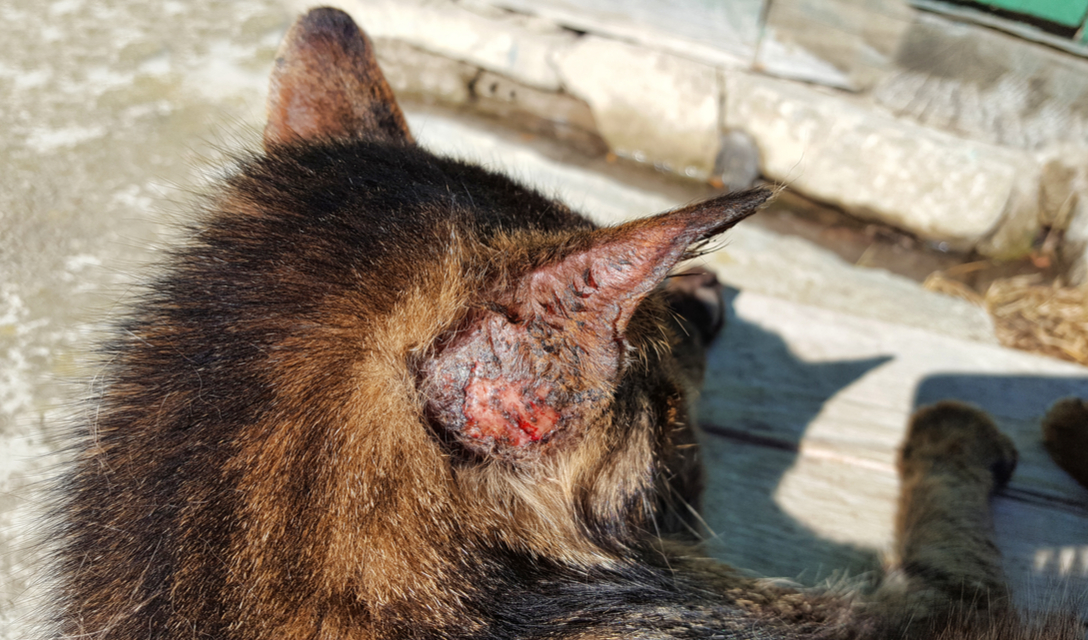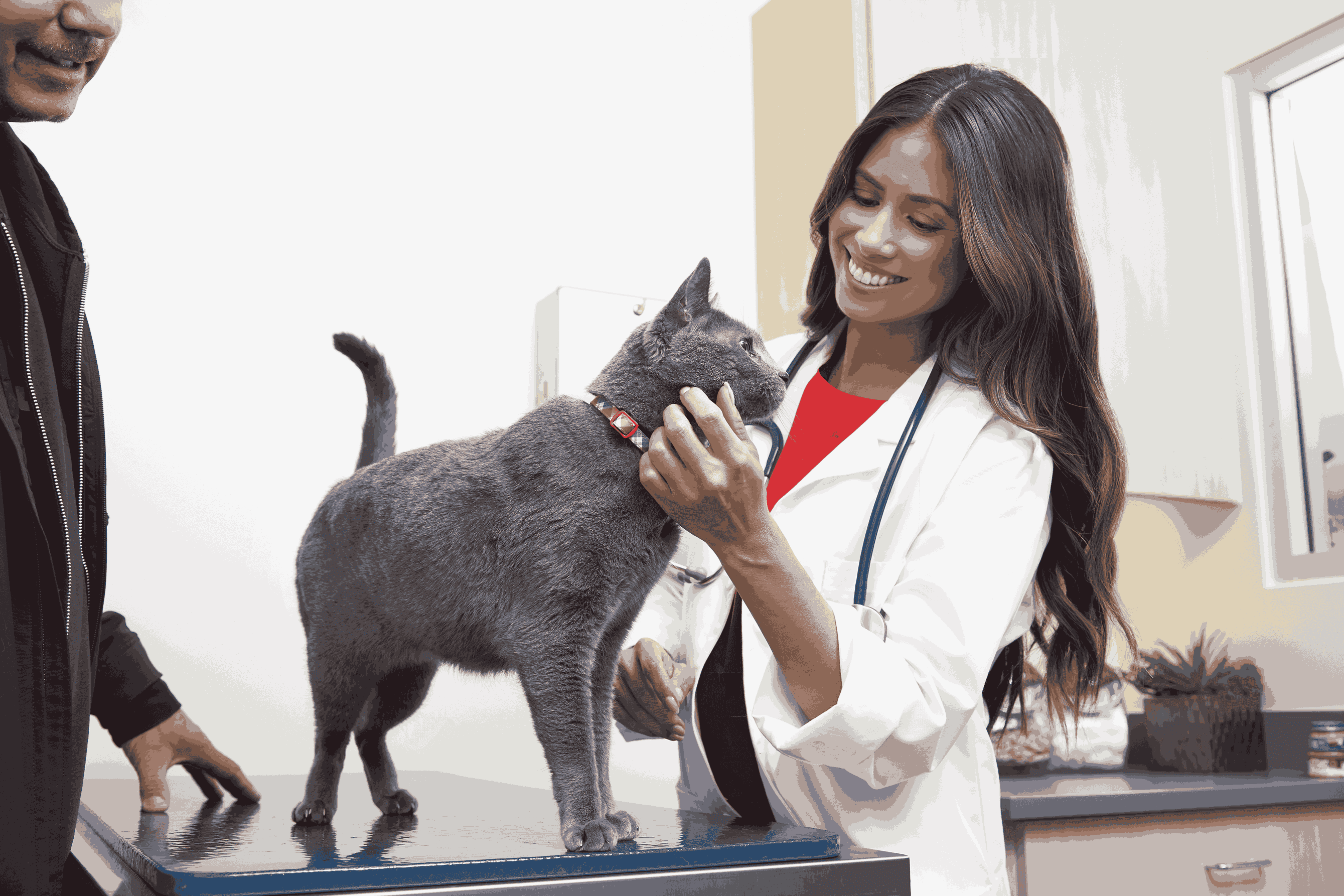Skin Ulcers and Lesions in Cats
Skin Ulcers and Lesions

SUMMARY OF CONTENT
SEVERITY:
-
 Resolves within days to months, or may be a lifelong management condition
Resolves within days to months, or may be a lifelong management condition -
 Treatable by a veterinarian, by the pet parent
Treatable by a veterinarian, by the pet parent -
 Prevention is possible in some cases
Prevention is possible in some cases -
 Transmission may be possible to other animals or to people for some conditions
Transmission may be possible to other animals or to people for some conditions -
 Diagnosis requires physical exam, skin cytology, skin biopsy, skin culture
Diagnosis requires physical exam, skin cytology, skin biopsy, skin culture
VERY COMMON IN
Symptoms & Signs
The first sign of a skin problem may be a crusty area on the skin, nose or foot. In other cases, skin problems may start out with small lesions that develop into more extensive lesions. They may open, drain and develop a crusty surface. In some instances there may be hair loss or the formation of ulcers. Cats may also become itchy or not want to be touched. In some cases, they may excessively lick or scratch the area that is bothersome.
Diagnosis
Your veterinarian will begin with a complete physical exam of your cat. This will include looking closely at the skin. Depending on the type of lesion, your veterinarian may recommend different diagnostic tests to find out what is causing the issue, or they may be able to prescribe treatment based on their initial findings. In many cases, a sample of the skin lesion is taken to observe the cells under the microscope. This can be done with a skin cytology, a skin biopsy or a fine needle aspirate. Depending on the type of lesion, the method of cellular collection varies and will be determined by your veterinarian. If underlying issues are also suspected, blood work, fungal cultures and other testing may also be recommended.
Causation
There are many different forms of skin lesions in cats that can lead to crusting or ulceration. The severity and treatment of these different conditions can vary widely, therefore it is extremely important that a veterinarian diagnoses the underlying condition. With most of these conditions, the outermost protective layer of the skin is damaged, making the underlying tissues more susceptible to infection or injury. This skin damage can cause discomfort to cats, which can cause them to scratch, lick or exhibit other signs of pain. The following list includes many of the more common causes of skin ulcers and crusts in cats, but it is not exhaustive: **Bacterial infections** * [Abscess](https://www.petcoach.co/cat/condition/abscesses/) (a pus-filled area of infection) * Pyoderma (a bacterial skin infection) * Folliculitis (inflammation of the hair follicles, can be caused by infection, parasites, allergies or trauma) * Furunculosis (inflammation of the deep layers of the skin and hair, typically caused by infection) **Fungal infections** * [Coccidioidomycosis](https://www.petcoach.co/cat/condition/coccidioidomycosis/) * Cryptococcus * [Histoplasmosis](https://www.petcoach.co/dog/condition/histoplasmosis/) * [Pythiosis](https://www.petcoach.co/cat/condition/pythiosis-1/) * [Ringworm](https://www.petcoach.co/cat/condition/ringworm/) * Sporotrichosis * [Zygomycosis](https://www.petcoach.co/dog/condition/zygomycosis/) **Parasitic** * [Demodectic or Notoedric mange](https://www.petcoach.co/cat/condition/demodectic-mange/) * [Flea allergy dermatitis](https://www.petcoach.co/cat/condition/flea-allergy-dermatitis/) * [Lice](https://www.petcoach.co/dog/condition/lice-in-cats-and/) **Trauma** * Bite wounds * Bee stings * Insect bites * Frostbite * Burns **Immune-mediated** * Systemic lupus erythematosus (an autoimmune disease where the body attacks healthy tissues, there may be a genetic component) * Pemphigus complex (autoimmune diseases affecting different layers of the skin) **Cancer** * Basal cell tumors * Epitheliotrophic lymphoma (a cancer of the lymphocyte blood cells in the skin) * [Fibrosarcoma](https://www.petcoach.co/cat/condition/vaccine-associated-sarcoma/) * Cutaneous hemangiosarcoma * [Lymphoma](https://www.petcoach.co/cat/condition/lymphoma-1/) * [Mammary cancer](https://www.petcoach.co/cat/condition/mammary-cancer-1/) * Mast cell tumor (MCT) * Melanoma * [Squamous cell carcinoma](https://www.petcoach.co/cat/condition/squamous-cell-carcinoma/) **Drug or injection reaction**
Treatments
AT-HOME CARE
SUPPORTIVE CARE
MEDICATIONS
DEVICES
SURGERY
SPECIALISTS
Cost Of Treatment
The cost to treat skin ulcers and lesions may vary depending on the underlying cause and severity. Most cases may be resolved for under $500. Complicated cases or cases requiring surgery may reach or exceed $1000.
Recovery
Most cats can recover from skin lesions over a period of days to months. In some cases, skin lesions are a chronic, lifelong issue.
Monitoring
Your veterinarian will work with you on how often your cat needs to be seen based on the condition they have.
Prevention
Prevention may be possible for certain parasites and the avoidance of trauma. Be sure to follow your veterinarian's recommendations for regular flea and tick prevention.
Disclaimer
The information contained on this page is for educational purposes only. Treatment should only be provided under the advice of a veterinarian who has examined your pet under the laws applicable to your state of residence.
Questions about Skin Ulcers and Lesions

Two Easy Ways to Start Earning Rewards!
Become a member today!Members-only pricing and offers, personalized care notifications, Vital Care points back on every purchase and more!Become a credit card member today!
Earn 2X Pals Rewards points at Petco
when you use Petco Pay!APPLY NOWLearn More About Petco Pay Benefits






